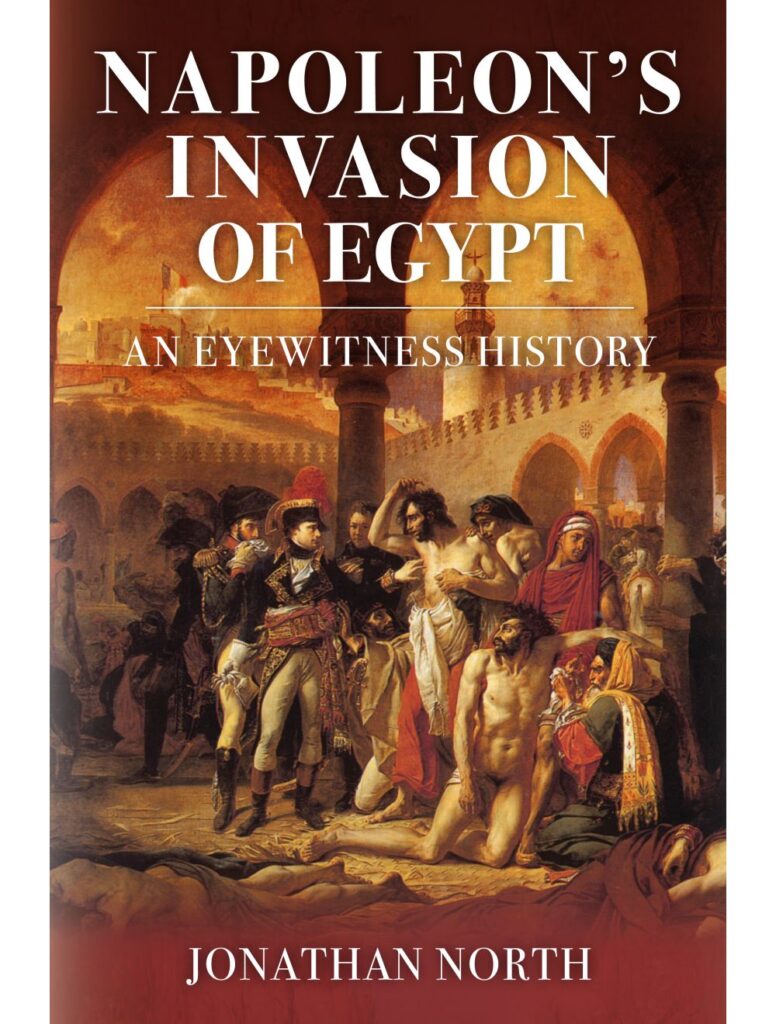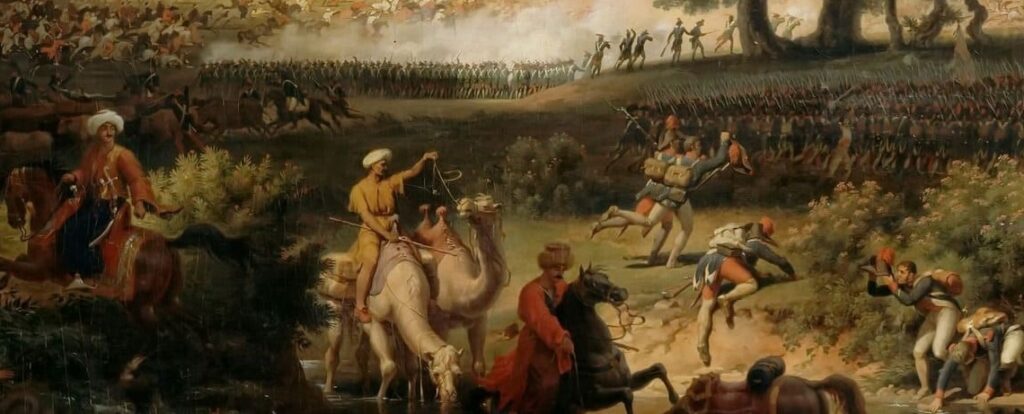
In July 1798 Napoleon invaded Egypt, landing an army in the stifling heat of a North African summer. His invasion came as a shock to the Egyptians but also as a surprise to the soldiers onboard his armada, for they had not been briefed on a mission designed to win glory for their general and, or so it appeared, untold riches for their government. For these soldiers who followed in Napoleon’s wake, trailing along through a sense of duty, or running to new adventures, the campaign which followed promised neither fame nor wealth. What it did offer was forced marches, endless battles against fearsome warriors and the occupation of a land which mesmerised and repelled them in equal measure.
Napoleon often bartered lives for glory, but this was never truer than during the expedition to Egypt. There, as 40 centuries looked down upon them, and the Egyptians cast scornful glances, his army struggled to forge a new empire of the sands. Under an unforgiving sun and before unforgiving enemies, they bore the brunt of Napoleon’s ambition.
Still, many found time to write down their adventures and impressions, and made sense of their experiences. This book retells the story of three years in the desert by brushing the sand from these accounts and presenting a history based on the words of these soldiers and the scholars and artists who accompanied them. They now emerge from the footnotes of more general histories and, through their diaries, letters and memoirs, we see the lands and peoples of Egypt, Palestine and Syria as they appeared to them. Their texts are woven together to form a narrative of events, but the emphasis is on the stories of those who were at once invaders, tourists and occupiers.
The effect is compelling for here monumental events are flanked by trekking through the hot sand and wonder beneath the pyramids and among the ruins of Thebes and Luxor. Here battles against Arab horsemen are followed by that more relentless, and less winnable, war against heat, thirst and flies. Other struggles also emerge from these pages. Of the stresses and strains the sons of the French revolution felt when encountering ancient customs and a defiant religion, and of the internal conflict generated when an army of liberation transforms itself into one of occupation.
History is at its most exciting when it deals with one world encountering another. Here we have two worlds colliding, and history written by those who felt the shock.
Please support your local bookshop, or order from Hive.co.uk which helps independent shops. Alternatively, order on Amazon.co.uk or Amazon.com

Excerpts from the book
On the people
By the infantryman Laporte:
“The traveller here feels like he has been taken to another world and when he sets foot upon it a mass of impressions bears down on him. A language which sounds barbarous and which has an unsettling effect on the ear, clothes which seem strange and bodies so odd, for instead of our exposed faces and hairy heads one sees with surprise sunburned faces with beards and moustaches beneath shaved heads.”
On the language
By the botanist Coquebert de Montbret:
“I spend much time learning Arabic and I now speak it quite well, such that I can make myself understood. I don’t pretend that I can deliver a learned discourse in Arabic, but I can tell a shopkeeper what I want, explain something to a servant, artisan or worker, or find out more about something I am curious about. I can read a little. I think that in another six months I will be quite fluent.”
On the food
By the engineer Thurman:
“My veterans sat with crossed legs and, having never before participated at such a feast, seemed embarrassed. They were clumsy in so many petty ways but then made a loud faux-pas, one brought about, no doubt by their posture. In revenge the Turks began to belch loudly.”
On the drink
By Galland the printer:
“I went to one of their cafes. The best one was a kind of shack or barracks without any furniture other than some big rugs on which you sit cross-legged. They only had some cafetières, some dirty little cups which are smaller than the ones we use, and a few pipes for smoking. The Egyptians do not put sugar in their coffee, they had to go off and look for some for the French. I asked for a spoon with which to stir my coffee and the waiter picked up a twig from the ground and handed it over to me. As there was nothing else, I was obliged to make use of it after wiping it on my handkerchief.”
On the women
By the clerk Peyrusse:
“We have been unable to find out if the women here, who have been so much spoken about, are as pretty as our French ones. Those we have seen to date have given us a poor opinion of their grace even though, as a rule, they are mostly kept locked up whilst those who do manage to appear are entirely covered from head to toe in a veil. We just get to see their eyes, which are black.”
On the dancers
By the artist Redouté:
“The women stay in one place and shake their hips whilst the rest of their body is kept still, they do this rhythmically and are extremely supple, indeed almost indecently so. They hold little cymbals rather like castanets between their thumb and forefinger and accompany their clanging with gestures that are far from graceful.”
On slavery
By Saint Hilaire the scholar:
“For 250 Francs I bought a child aged 11 [Tendelti] and I have taught him to take care of my collection and feed the animals. Since then I have also been given an old black woman and she has proved adept at managing my domestic affairs. Slavery here is not quite what it is in the Americas. It is more like adoption. My two slaves refer to me as their father and I am so content with them that I show them the same kindness.”
On the history
By the officer Miot:
“An ignoramus pushes on past without regret, whereas an educated man will pause and reflect at each moment. There is a stone, there a monument which will call to mind a battle which decided the fate of an empire or the destiny of a hero. A knoll will go unnoticed by one but for the other will call to mind a great event of history or the siege of a great city which time has erased. Thus the ignorant stagnate whilst the wise man sees into the past, the present and perhaps even the future.”
On the pyramids
By the officer Vaxelaire:
“As we marched along we passed close by the pyramids of Egypt which were once counted as one of the Seven Wonders of the World. They are very ancient, the most ancient that time has spared, although nobody knows when they were built. There are three main ones and they are 400 paces from each other and the biggest is 500 paces high and each face 680 paces wide. …. A few paces from this pyramid there is an enormous sphynx made from stone.”
On the fighting
by the hussar Desvernois:
“As the battle drew to a close, a tall Mameluke bey, boasting a long and luxurious white beard, rode out from their ranks and, as he passed the ranks of General Bon’s men, fired some pistol shots in order to provoke the French infantry. Seeing this, anger seized me and I spurred my Arab stallion forward, shooting past General Bon’s square and drawing close to this audacious bey. Shot was falling all around us but we ignored it. I fired my pistol and his horse went down. He shook himself loose and crawled towards me. Seeing him do so I thought he was coming to implore mercy. To show him he had nothing to fear I tucked my sabre away and opened my arms wide. But I had not counted on my enemy. He continued forwards, defiantly. I turned my horse to avoid the man’s sabre but this slight movement played into my enemy’s hands as he was able to come under my horse, and, quick as a serpent, seize the reins with his left hand and deliver a blow with his sabre with the right. My horse took the force of this, but I was able to hack at his hands and land two or three blows to his head. Wounded quite badly, he went down only to try again. I was tired of this game, so I threw myself onto him and staved in his head.”
On the goodbyes
By Miot:
“Goodbye Egypt! Goodbye Muslims! We are leaving your land and taking with us the lasting memory of the superb monuments scattered across it, the unhappy recollection of your deserts and your sad houses and memories, just as poignant, of what we suffered for having troubled your slumber and covered your shores in blood.”
On the adventure
By Colbert of the cavalry:
“I have travelled through the Holy Land, I was at Nazareth, and I saw the castle of Safed where the cruel and holy Jew [Judith] cut off the head of Holophernes. I have drunk from the river of regeneration where John the Baptist baptised his believers. I have seen Genezareth and the lake of Tiberias and that of Galilee where the possessed herd of swine rushed off the cliff. I have seen Mount Tabor, where the Transfiguration took place, and Mount Carmel. I shall stop now for fear of boring you with all my ‘I have seens’. I wish I had brought something back from Egypt but they do not have much worth buying, the things that I liked, such as the scimitars from Damascus or Persia, the weapons of the Mamelukes, were hardly likely to please my nieces, and yet I rate them highly as souvenirs of our wars in Africa and Asia.”